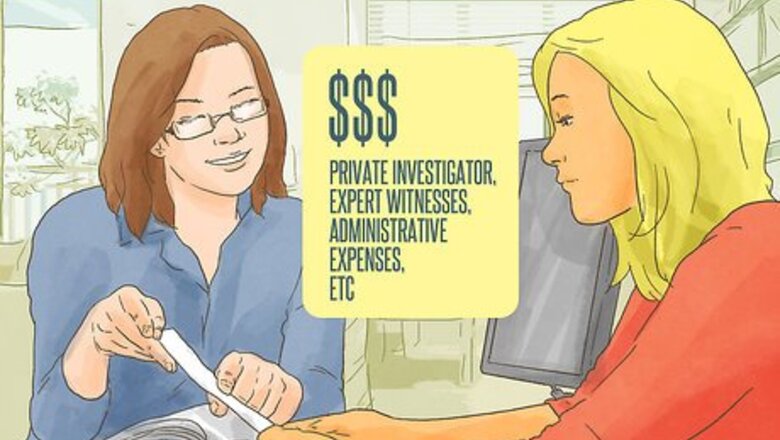
views
Asking the Lawyer about Fees
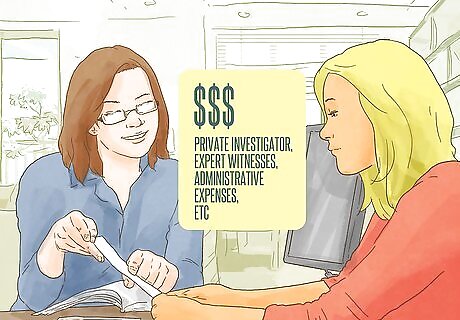
Find out what the lawyer bills for. You might think a lawyer will only bill for the hours he or she spends on the case. But lawyers pass on many costs to their clients. Before hiring a lawyer, you should know what they will charge you for. For example, you will probably have to pay for the following: costs of a private investigator fees for expert witnesses costs of copying and mailing documents costs of filing documents with a court the cost of a mediator, if you try to mediate the dispute

Ask how the attorney bills. Most attorneys bill by the hour. For example, an attorney might charge $200 an hour and bill in fifteen minute increments. For each 15 minutes the attorney worked on your case, you would be billed $50. If the attorney charges by the hour, ask what their hourly rate is. Also ask about possible alternative fee arrangements: Hourly billing with a cap. You pay per hour, but only up to a maximum amount. After that point, the attorney works for free. A flat fee. With a flat fee, the attorney quotes you a price and charges only that amount. The attorney uses their best judgment to estimate how much time it will take to handle your case. Flat fees are often used for drafting wills, filing for bankruptcy, or handling a simple, uncontested divorce. Contingency fee. This type of agreement is most common in personal injury and disability lawsuits. The attorney doesn’t charge a fee; instead, he or she takes a percentage of any amount you get in a settlement or in a jury award. Generally, they take 33-40%. You still have to pay court costs, such as filing fees and costs associated with court reporters or expert witnesses. Unfortunately, contingency fee arrangements are not allowed for criminal cases.
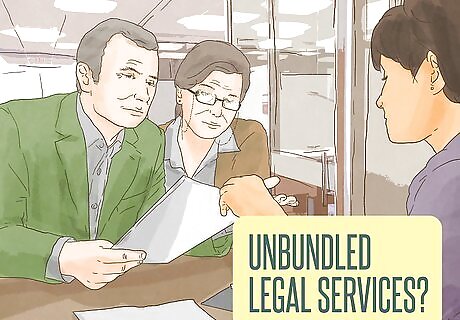
Check if the lawyer offers “unbundled legal services.” If money is tight, then you might want to handle most of the lawsuit yourself. You could then pay a lawyer for advice or to do the tasks that you find too complicated or don’t have time for. This is called “unbundled legal services” or “limited scope representation.” Most states allow lawyers to offer limited scope representation. Ask the lawyer if he or she offers this arrangement. For example, you might want to file all of the court forms yourself but pay the lawyer to look them over and then represent you during your trial or hearing. By using the lawyer’s time strategically, you save money.

Check if you must pay a retainer. A “retainer” is a sum of money that you pay upfront in order for the attorney to agree to start representing you. For example, a criminal defense attorney might ask for a $5,000 retainer upfront. The attorney then deposits this money in a special trust account. The retainer provides the attorney with some protection. For example, you might lose your job soon after the attorney starts representing you. As the attorney does work, he or she sends you a bill and then deducts the amount from the retainer. You won’t have to pay more until the retainer has been entirely eaten up. If the case finishes and some of the retainer money remains, then the remainder is refunded to you.
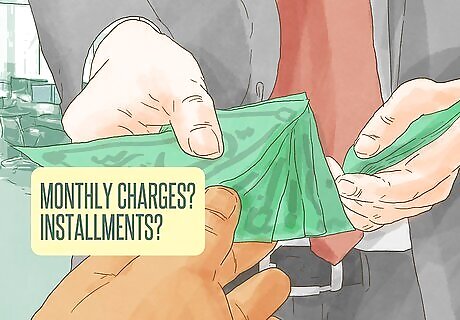
Ask about a payment plan. You also should find out if the lawyer will let you stretch out payments over a period of time by using a payment plan. Payment plans are often used when the lawyer charges a flat fee, for example in simple bankruptcies or uncontested divorces. For example, the lawyer might charge you $100 a month. You then pay in monthly installments until you have paid the entire bill off.

Compare fees for different attorneys. Once you have met with all of the attorneys on your list, you should compare their fees. Also compare their relative experience. If a lawyer has more experience, then it would be normal for he or she to charge more per hour.
Raising the Money

Check if your insurance will cover your defense. If you are a professional (such as a doctor or lawyer), then you may have professional liability insurance. If you were in a car accident, then check to see if your insurance policy has a “duty to defend” provision. With this provision, your insurer agrees to pay for a lawyer’s legal fees as well as for the costs of the defense. You should also check your homeowner’s insurance. These policies often contain promises to defend the policyholder. Be sure to contact your insurer as soon as you think someone might be able to file a claim against you. Insurers often have strict deadlines you must meet for informing them of potential liability.

Pay with a credit card. Ask the attorney if he or she accepts payments with credit cards. By putting your legal fees on a credit card, you can stretch payment out over a decade or longer. Because you pay interest, you will end up paying more than the amount of legal services you received. However, paying with a credit card might be the only way you can afford a good attorney.

Mortgage your house. It is never easy to mortgage your house to pay for a lawyer, and in most situations, it is not advised. However, people facing serious criminal charges which could result in long prison sentences have an incentive to get the best legal help they can afford. Your home is probably your largest asset, so you could get a home equity line of credit or reverse mortgage. You can then use the equity to pay for your lawyer.

Dip into your savings. You might have been saving money for your children’s college or for a rainy day. You could always take money from your savings to pay for the lawyer. Also look into taking money from your retirement accounts. In some situations, you might be able to cash out a retirement account early. As with mortgaging your house, these are not ideal options. However, they may be the best option, especially if you can’t get a contingency fee arrangement.

Raise money with crowdfunding. Crowdfunding is a way of raising money from a large number of strangers, often over the Internet. You create a profile on a crowdfunding site and explain why you need to raise money. Strangers can then choose to donate to you. These crowdfunding sites will charge you a percentage of the amount raised as well as credit card processing charges. Two common crowdfunding sites are: Funded Justice GoFundMe
Keeping Legal Fees Low

Read your fee agreement before signing. After you hire a lawyer, he or she should send you a fee agreement. This agreement should spell out in detail what you will be billed for. You should read this agreement closely before signing it. The written agreement shouldn’t differ from what the lawyer has told you orally. If it does, then call and point out this discrepancy. Don’t sign the agreement until you agree with everything in it.

Request itemized bills. Your lawyer should send you a monthly bill in which he or she breaks out how much time was spent on each task. In fact, you probably have a right to an itemized bill. If the lawyer resists giving you an itemized bill, then you should consider ending the relationship.

Review the monthly bill. As soon as you get your bill, you should go through it and check if you understand everything you are being billed for. Itemized entries should be easy to understand. For example, “worked on case” is too vague. However, “drafted answers to discovery requests” is clearer. Also check that you weren’t accidentally double-billed for something. Pay attention to fee increases. If the lawyer increases the hourly rate, then he or she should tell you ahead of time. If the lawyer works in a larger firm, then make sure two or more lawyers aren’t billing for the same task. Also make sure that a senior lawyer isn’t spending a lot of time revising the work of a junior lawyer. You shouldn’t have to pay more money because a junior lawyer does sloppy work.

Raise concerns with the attorney. If you have questions about a charge, then you should raise the issue with the attorney. Write a letter and keep a copy for your records. Highlight whatever charge you disagree with and send a copy of the bill with the letter. Ask the attorney to get back to you. If the attorney calls, then keep detailed notes about the conversation. Write down the day and time of the conversation, as well as what the attorney said. Try to get your attorney to reduce the charge or write it off altogether. Sometimes attorneys make mistakes when billing, and an attorney should be willing to write off a charge if it is indeed a mistake.

Fire the attorney if you think you are being defrauded. You have a right to let your attorney go if you are unhappy with their services. You don’t have to justify firing them or even give them a reason. However, you should think carefully. It will take a new attorney time to get caught up on your case, and the attorney will charge you for that time. If you think your attorney has cheated you out of money, then you should contact your state’s disciplinary commission and file a complaint against the attorney.

Arbitrate a fee dispute. If you and the lawyer have a disagreement about fees, then you can have arbitration. Many fee agreements contain a clause requiring that you arbitrate fee disputes. Some state and local bar associations will provide the arbitration. If you are unhappy with the results of the arbitration, then you can file a lawsuit. Arbitration is a like a trial, though often less formal. One or more “arbitrators” will hear the case. They act as judges. You should explain to the arbitration panel why you think the fee was excessive. If the panel agrees, you can get a refund from the lawyer.
Finding a Good Attorney
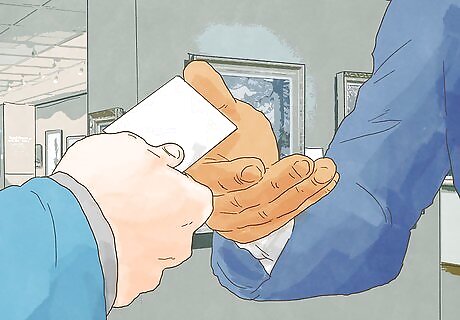
Get referrals. You first need to find a good attorney. You should get a handful of referrals. You can then research the attorneys to see if their background is a good fit. You can get referrals in the following ways: Ask people you know. Someone might have used an attorney recently for a similar problem. If you need an attorney to help you draft a will, then ask someone who has had a will drafted recently. You can ask friends, family, and colleagues. Ask another attorney. Attorneys are a good source of referrals. They are familiar with the reputations of other attorneys and can steer you toward a qualified one. Check with your union or employer. Some unions and employers arrange for lawyers to represent their members at a discounted rate by offering “legal insurance plans.” For a small fee, you gain access to an attorney who can perform some legal tasks for you. You should check with a shop steward or with your Human Resources department. Contact your local bar association. Bar associations are professional groups of attorneys. Most run a referral service or can help you find an attorney. You can find your nearest bar association by visiting the American Bar Association’s website.
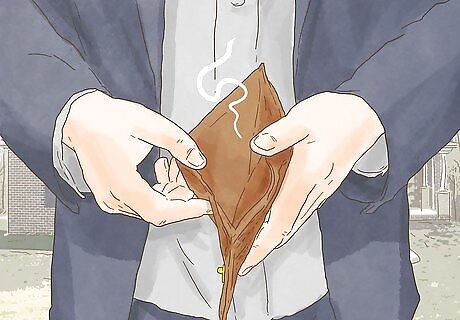
Look into legal aid. If money is tight, then you could still get excellent legal help through a legal aid organization. Legal aid provides free legal services to people in financial need. You can find nearby legal aid organizations by visiting the Legal Services Corporation’s website and clicking on the “Find legal aid” link.

Research the attorneys’ websites. Once you have several referrals, you should find their websites. Most lawyers have websites now and you should study them for helpful information: Experience. The attorney should list relevant matters they have worked on. Check to see that they have handled cases similar to yours. For example, if you need an adoption attorney, then you probably wouldn’t want to hire someone who has handled mostly criminal law. Expertise. Check to see if the attorney has been certified as a specialist in their field. Many states certify lawyers as specialists if they have devoted a sufficient amount of time to the field, get recommendations from peers or judges, take advanced legal education classes, and pass an exam. The size of the firm. It sometimes is helpful to hire a lawyer who works with other attorneys. If your case is very big—for example, you want to start a class action—then you wouldn’t want a solo practitioner. Overall presentation. A website with typos and grammatical errors signals that the lawyer is sloppy. Check to see that the lawyer maintains a professional appearance.
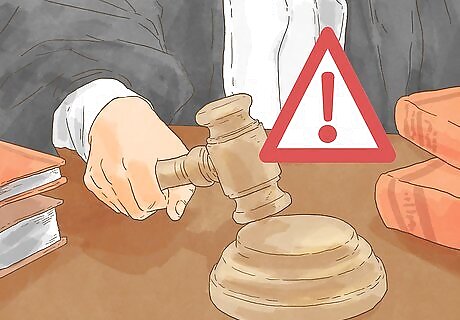
Check each attorney’s disciplinary history. Each state has a commission that investigates allegations of attorney misconduct. You should find your state’s commission and look up all of the attorneys on your list. You can search most state databases by the attorney’s name. If the attorney was sanctioned for an ethics violation, then a notation should be made on his or her record. Be aware of how much time has passed since the violation. An attorney might have committed an ethical lapse 30 years ago. In the interim, he or she might have become a much better attorney.

Look at reviews. Many websites post reviews for lawyers and law firms. For example, Yahoo, Yelp, and Avvo all allow clients to post reviews of lawyers. You can type a lawyer’s name into a search engine and then read reviews. Remember to take the reviews with a grain of salt. People who have had a negative experience are often more motivated to leave a review than someone who was generally happy with the lawyer. However, do pay attention to trends. If you see several people complain that the lawyer doesn’t return phone calls, then you can safely assume that the lawyer has a problem in that area.

Schedule a consultation with several attorneys. Take out your list and cross off anyone who doesn’t seem qualified based on your research. Then call and schedule a consultation with each attorney remaining on your list. Most attorneys offer 15-30 minute consultations for free or for a reduced fee. Ask how much the attorney charges for the consultation when you call. You shouldn’t hesitate to pay a modest fee. Many free consultations are little more than infomercials. By paying even a little money, you can guarantee more of the attorney’s attention. Also ask what you should bring to the consultation. For example, if you were in a car accident, then the attorney would want to see a copy of the police report, as well as copies of medical records, medical bills, insurance policies, and any written communications with the other side.
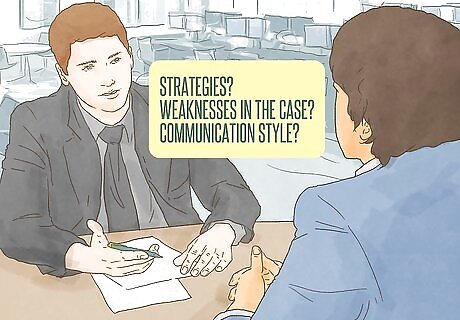
Ask questions during the consultation. During the consultation, the lawyer will listen to you describe your situation and look at any relevant documents. There should be time for you to ask some questions. Remember not to ask any question you can answer by looking at the lawyer’s website (e.g., “Where did you go to law school?”). Instead, think of asking questions like the following: What do you think is the likeliest resolution of this case? What are weaknesses in my case? What are strengths? What other evidence should I get to make my case stronger? What strategy do you propose for handling the case? What is your communication style? Do you prefer phone calls or emails? Do you respond personally or have an assistant?


















Comments
0 comment